Angela Ackerman's Blog: Writers Helping Writers, page 35
July 13, 2023
Do Your Characters Have Agency?
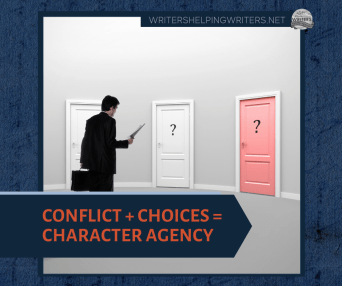
Consider, if you will, a story about a woman who wants to gain esteem by winning an important legal case. Things are going along fine until she gets fired from the firm for her unusual fact-finding practices. She ends up being forgiven and rehired, but her babysitter bails, leaving her with no one to watch her kids. Then, at a critical point in the case, she gets so sick, she’s unable to keep working.
It could be an interesting plotline. Obstacles are blocking her from her goal, which is a good thing. But it falls flat because the character isn’t driving the story; the events are. Instead of making things happen, she’s just reacting to what���s thrown at her. She has no control over her destiny.
But look what happens when we rewrite the story with her in charge:
To make ends meet, Erin pesters her lawyer to hire her as a secretary. In the scope of her work, she discovers information in a seemingly innocuous file that doesn’t make sense. She secures permission to do a little digging, but there’s a miscommunication with the boss, who doesn’t expect her to spend a full week off-site doing research. He fires her before realizing that her fact-gathering revealed a huge human rights violation���something Erin discovered when she took the initiative to investigate. So she’s reinstated. But then she loses her babysitter. This doesn’t set her back for long because she quickly finds a replacement in the guy next door (taking a step toward an important romantic relationship in her story). The case progresses to a critical point, at which time she falls deathly ill. But she soldiers on and goes to the office anyway, where she learns that decisions about her case have been made expressly behind her back���
Both summaries tell Erin Brockovich’s story, but the second one puts her behind the wheel. Each time she���s hit with a problem or roadblock, she makes a choice or acts in a way that pushes the story forward and inches her closer to her goal. This is the essence of character agency.
It’s not a simple element to define, but at its most basic, character agency is the character driving story events through choices. When conflict happens, she doesn’t just sit there; she takes action. She chooses, and by doing so, determines what comes next.
Agency is important because, without it, it’s not really the character’s story. She may be in it, but if she’s not making things happen, accelerating events, and actively working toward her goal, what’s the point? If nothing the character does changes the outcome of the story, why is she in it?
The fact is that you don’t see many successful tales about protagonists with no agency; most of the time, they just don’t resonate with readers because the character is a bystander in their own life. To write a compelling story and inspirational protagonist, put the hero in the driver’s seat so they can navigate the roadblocks and reach the finish line in their own unique way.
How do we do that, exactly?
Use Choices
One of the things we discuss in the first volume of The Conflict Thesaurus is the 3C cycle of conflict, choices, and consequences. In a nutshell, when conflict is introduced for a character, a choice must be made, and consequences will follow. This cycle is repeated many times throughout a story. Sometimes the character makes a choice that propels them toward their goal. Other times, their decision pulls them in the wrong direction. Either way, they have a say in what’s happening to them.
The conflict scenarios you introduce, and the choices that stem from them, are key to giving your character agency in their story. Plan with this in mind and use conflict with purpose to encourage (or discourage) decisions that will get the character where they need to go.
Include a Goal in Every SceneChange doesn’t happen overnight. Success for your protagonist consists of many baby steps that get them to that final objective. This is why a story has scenes, and every scene needs a goal of its own.
Let’s say your protagonist is a cop with questionable methods whose overall objective is to rescue someone from a captor. At the start, he won’t know much, but every scene will include a goal that will get him closer to finding the captive. The objective of one scene might be to speak to the neighbor who last saw the victim. Another goal could be to interview a key suspect. He might need to win over a supervisor who doesn’t think he can handle the case.
If your character lacks agency, it could be because your scene-level goals aren’t defined enough; if he doesn���t know what he’s working toward, then his choices won’t matter. He might make decisions, but they’re going to be all over the map because he lacks direction. And a protagonist who wanders aimlessly doesn’t have agency. So know your character’s goal in each scene.
Every Scene Needs ConflictOnce you know your character’s scene goal and you’re sure it belongs on the roadmap to their overall objective, add conflict that makes it harder for them to get there. Conflict makes things interesting, yes, but it also requires a response.

In our scene where the cop needs to interview a suspect, maybe the guy asks for a lawyer, which will make it difficult to get answers. How does the protagonist react���does he try to convince the suspect that he doesn’t need legal representation? Use force to coerce him? Bug the guy’s briefcase so he can get the information (illegally) without an interview?
Every scene needs conflict because it provides opportunities for the character to go one direction or another. The decision to use physical force or blackmail could get the cop his answers, but if he’s trying to turn over a new leaf and act ethically, it could push him farther from that internal objective��� something he’ll have to address in later scenes. However he responds to the conflicts that arise, he’s choosing, and those choices will help determine his fate.
Your Character Must Do the ChoosingConflict alone won’t give your character agency. If the events in their life don’t give them a choice���if they are forced to adopt a certain way of thinking or comply to a course of action���then someone else is running the show. If our cop is essentially a puppet who was given the case because it’s political and his supervisors want things to go a certain way, they will be dictating his actions. Whatever conflict comes along will already be decided because he’s going to do what his boss says. ���Yes��� men and followers don’t typically make the best protagonists, so create a way for a pinned-down character to resist and go rogue.
You can get the same problem in stories with supernatural elements. Monsters, magic-wielders, demigods, and the like will have an edge over mere mortals. Or consider Mother Nature���how can the protagonist overpower an earthquake or tsunami? They can���t.
Basically, any antagonist with an inordinate amount of power or leverage has the potential to steal your character’s agency. Keep that in mind and find ways to make your protagonist the decision-maker.
A good example of this is found in the first Lord of the Rings book. On their trip to destroy Sauron’s ring, the fellowship has to get over a mountain. But Saruman sends a supernatural storm that makes it impossible for them to cross. Instead of shrugging their shoulders and plodding back down to safe ground, they call a meeting in the middle of the blizzard. Caradhras is a no-go, so what route will they take next? Only after Frodo has made the decision to go through Moria do they leave the mountain.
This could easily have been a situation where the characters allowed story events to displace them and move them around. But Tolkien didn’t let that happen. He gave them the opportunity to choose. That choice had consequences, as we see in later chapters, but it also allowed the characters to set their own course.
And this is how you build character agency: by making choices as the author that provide choices for the protagonist���the results of which will impact their story. Simple? Yes. Easy? No, sadly. But if you plan and/or revise with this in mind, it will become second nature. And you���re sure to start your character on a path that puts them in charge of their own destiny and story.
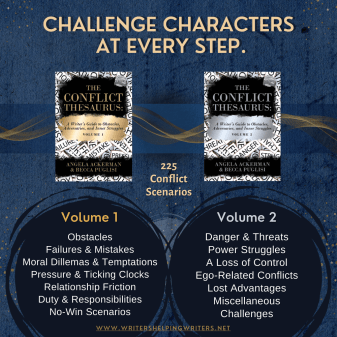 Want to take your conflict further?
Want to take your conflict further?The Conflict Thesaurus: A Writer’s Guide to Obstacles, Adversaries, and Inner Struggles (Volume 1 & Volume 2) explores a whopping 225 conflict scenarios that force your character to navigate relationship issues, power struggles, lost advantages, dangers and threats, moral dilemmas, failures and mistakes, and much more!
The post Do Your Characters Have Agency? appeared first on WRITERS HELPING WRITERS��.
July 11, 2023
When is the Best Time to Release a New Book?
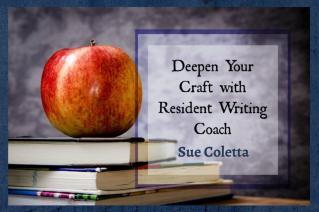
Strategic timing of a book���s publication date can give it a boost and have a major impact on its long-term success. Commercial publishers and booksellers have known this forever.
Are certain days, months, or dates better than others?
Well, it depends on the book.
January ��� MarchThe first quarter of the year is the perfect time of year for business, self-improvement, health, and writing craft books, as people are eager to stick to their New Year���s resolutions.
Genre fiction also does well in the first quarter. For many of us, the first quarter means terrible weather (I���m in New England). We���re looking for new books to pass the time while stuck indoors. Also, many readers received new tablets, e-readers, or gift cards for gifts. Shiny, new books become irresistible.
Peak reading and buying season are very much tied to the weather. February and March are generally good times to release a novel because the weather���s not great. Snow and ice forces readers to browse the web for their next adventure.
The exception is children���s books. If you���re a children���s book author, wait for the second quarter of the year. Kids received books during the holidays and parents feel they���ve spent enough already. Also, they���re back in school, which leaves less time for pleasure reading.
April ��� JuneThe second quarter is another perfect time to release genre fiction, as people are going on vacation and finally getting to that book they���ve been dying to read all year. It makes sense to release a genre novel in the spring, so momentum can carry over into the summer.
What about children���s books? Easter is the second busiest time of year for kids and gifts. Parents are looking for various things to occupy their kids��� time. Books offer a great way to keep kids learning and occupied. Activity books for kids also do well during this time.
July ��� SeptemberIn the third quarter, business books and self-help books become popular again. Releasing virtually any book ahead of the holiday season is a smart idea. August isn���t ideal for two reasons. First, readers are often away, and things are quiet. Vacationers have already purchased their beach reads. Second, media outlets are slower to respond in August, if you���d hoped to advertise or score a review.
October ��� December
October is a terrific month for horror, thrillers, and mysteries���these genres dominate the marketplace, the darker the better. A cozy mystery or HEA romance may not do well in October. Historical fiction, depending on the subject matter, or dark romance might be all right. Really think about your genre and when you tend to buy books. It will help you understand the best time of year to release your book.
If you wait until the latter half of November, you might be too late unless you���re targeting a niche market.
December is the worst month of the year for new books. Even if you���re releasing a Christmas-related title, you���re better off planning for Christmas in July (and use the hashtag!).
If this logic doesn���t make sense to you, consider this: When do stores change their seasonal displays? They don���t wait till December, do they? Nor should we. Even if you write a series with eager fans, try to hold off till after the new year. Your readers are too busy with the bustling holiday season to read and review a new release.
Niche MarketsWhenever possible, try to find a niche for your new book baby. Consider the themes, locations, and plot of your book. Character flaws, race, worldviews, etc. can also fall into niche markets. Is there an element of your book that you can tie to a holiday or commonly known date? Think: Romance novels releasing near Valentine���s Day.
Dig deeper than the holidays. What if the protagonist is a 9/11 survivor? Or the heroine lost her life partner in the bombing? A September release makes sense, right? If your MC is a new bride, release during peak wedding season and show the connection in your marketing.
I found this calendar on Self-Publishing Review to help spark new ideas for you.
Does the Day of the Week Matter?
Big 5 publishers release on Tuesdays. Since major bestsellers are compiled on Tuesdays, some say a Tuesday release gives the title a full week to gain traction before the weekend. Readers and booksellers look forward to Tuesdays because of the hot-off-the-press releases. Why not take advantage of the buzz?
That���s up to you, of course, but let���s look at why the beginning of the week���Monday, Tuesday, or Wednesday���tends to work better than the end.
In addition to the Big 5 releasing on Tuesdays, movies come out on DVD on that day as well. So, it���s a well-accepted day to release new material into the hands of eager readers. That said, many indie authors agree that Monday, Tuesday, or Wednesday are all beneficial. While Tuesday may be more traditional, we don���t need to stick to tradition, do we? The beginning of the week works best because of the way Amazon records weekly sales. If you���re shooting for a bestseller category, you���ll want time to garner sales before the weekend.
The same holds true for monthly sales.Releases in the first two weeks of the month gain better momentum than books released during the last two weeks because of how Amazon records sales. Also, readers are more willing to spend money at the beginning of a month. But again, if you���re releasing series novels and your readers are foaming at the mouth, you may want to publish as soon as they���re ready, regardless of the date.
Do you consider the date of book launches? What month/day/date worked well for your books, and why?The post When is the Best Time to Release a New Book? appeared first on WRITERS HELPING WRITERS��.
July 8, 2023
Character Type & Trope Thesaurus: Free Spirit
In 1959, Carl Jung first popularized the idea of archetypes���”universal images that have existed since the remotest times.” He posited that every person is a blend of these 12 basic personalities. Ever since then, authors have been applying this idea to fictional characters, combining the different archetypes to come up with interesting new versions. The result is a sizable pool of character tropes that we see from one story to another.
Archetypes and tropes are popular storytelling elements because of their familiarity. Upon seeing them, readers know immediately who they’re dealing with and what role the nerd, dark lord, femme fatale, or monster hunter will play. As authors, we need to recognize the commonalities for each trope so we can write them in a recognizable way and create a rudimentary sketch for any character we want to create.
But when it comes to characters, no one wants just a sketch; we want a vibrant and striking cast full of color, depth, and contrast. Diving deeper into character creation is especially important when starting with tropes because the blessing of their familiarity is also a curse; without differentiation, the characters begin to look the same from story to story.
But no more. The Character Type and Trope Thesaurus allows you to outline the foundational elements of each trope while also exploring how to individualize them. In this way, you’ll be able to use historically tried-and-true character types to create a cast for your story that is anything but traditional.
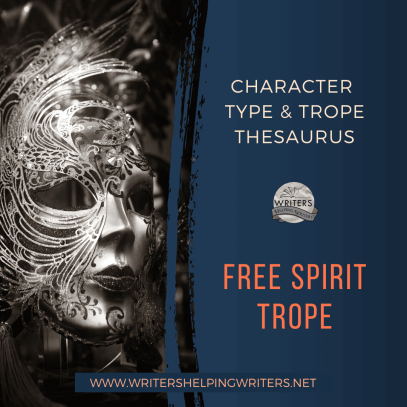 Free Spirit
Free SpiritDESCRIPTION: This character walks to the beat of their own drum and is comfortable being different. Because they don���t conform to traditional norms, they also don���t expect others to do so, which makes them highly tolerant individuals.
FICTIONAL EXAMPLES: Luna Lovegood (the Harry Potter series), Jane Eyre (Jane Eyre), Phoebe Buffet (Friends), Jeff Spicoli (Fast Times at Ridgemont High)
COMMON STRENGTHS: Adventurous, Confident, Courageous, Creative, Curious, Enthusiastic, Happy, Idealistic, Imaginative, Independent, Passionate, Playful, Quirky, Resourceful, Spontaneous, Spunky, Uninhibited, Whimsical
COMMON WEAKNESSES: Childish, Disorganized, Flaky, Foolish, Forgetful, Frivolous, Impulsive, Inattentive, Irresponsible, Mischievous, Rebellious, Reckless, Scatterbrained, Self-Indulgent, Temperamental
ASSOCIATED ACTIONS, BEHAVIORS, AND TENDENCIES
Thinking for themselves; not being easily led
Shunning routines and systems
Frequently challenging conventions just by being themselves, in a non-confrontational way
Enjoying solitude
Easily standing up for themselves
Being unconcerned with what others think
Eagerly trying new things
Being curious
Ignoring naysayers and pessimists
Being a trendsetter
Expressing themselves creatively
Being unpredictable
Empathizing with others who are minimized, made fun of, or not taken seriously
Valuing freedom; not wanting to be tied to down (to places, people, responsibilities, expectations, etc.)
Living in their own heads
Enjoying travel
Being tolerant of other people’s choices
Being friendly
Easily dismissing insults from others
Keeping an appearance that doesn’t comply with current trends
Being easily distracted by new situations and opportunities
Not being prone to regret
Flightiness
Being perpetually late to events
Disregarding certain rules or expectations because the character views them as unnecessary or silly
Lacking discernment; not being able to read people very well
Being impulsive and not thinking through the consequences of their actions
Being impractical
Lacking strong financial sense
SITUATIONS THAT WILL CHALLENGE THEM
Joining an institution that forces them to follow the rules, such as the military
Living in a time or place where nonconformity is dangerous
Doing something impulsive that has terrible consequences
Being too curious and discovering something that could get them in trouble
Falling in love with a rule-follower
Being bullied or persecuted for their differences
Causing a family dispute because of their refusal to act a certain way
A hard situation that challenges their easygoing outlook on life, such as a dire medical diagnosis or a cultural inequity that must be rectified
INNER STRUGGLES TO GIVE THEM DEPTH
Wanting to be more organized and prepared but not wanting to make the changes this would require
Being deeply hurt by teasing and bullying but feeling the need to pretend like it doesn’t bother them
Wanting purpose but being unable to focus on one thing for an extended period of time
Developing deep feelings for someone but fearing the commitment will jeopardize the character’s freedom
Wondering if they’re not being taken seriously (at work, in their family, etc.)
TWIST THIS TROPE WITH A CHARACTER WHO���
Is surrounded by people like them (instead of them being the oddball in the group)
Is responsible and successful despite their free-spiritedness
Is in a stable, healthy, long-term relationship
Regrets the impact of their lifestyle on the people they love
Is free-spirited only in certain environments
Is paranoid about one specific situation
Has an atypical trait: analytical, pushy, proper, mature, worrywart, needy, etc.
CLICH��S TO BE AWARE OF
The free spirit who goes where the wind blows, never staying in one place for long
The character whose wardrobe is over-the-top unbelievable
The ’60’s throwback hippie free spirit
The free spirit with no deep friendships who is content on their own
Other Type and Trope Thesaurus entries can be found here.
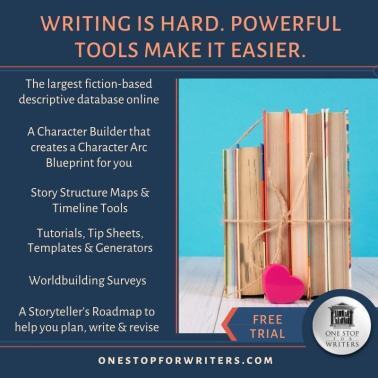 Need More Descriptive Help?
Need More Descriptive Help?While this thesaurus is still being developed, the rest of our descriptive collection (16 unique thesauri and growing) is accessible through the One Stop for Writers THESAURUS database.
If you like, swing by and check out the video walkthrough for this site, and then give our Free Trial a spin.
The post Character Type & Trope Thesaurus: Free Spirit appeared first on WRITERS HELPING WRITERS��.
July 6, 2023
Three Things Your Author Newsletter Must Do to Please Subscribers
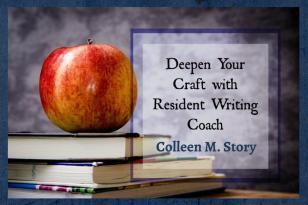
I hear writers talking all the time about building their enewsletter subscriber list. Build a subscriber list, the thinking goes, and you���ll sell more books.
Except it���s not that simple. These authors are focused on only the first half of their job: attracting new subscribers to their list.
They���re missing���often, completely neglecting���the other half: pleasing those subscribers once they get them.
Are You Too Focused on Numbers?Holding a giveaway where you gather a long list of new subscribers may feel exciting in the moment. But how excited will you be when most of those subscribers unsubscribe? Or ignore your enewsletter completely, letting it collect dust in some unchecked inbox?
Dead weight on your newsletter may boost your numbers, but that doesn���t help you much. Those who aren���t regularly opening, reading, and clicking aren���t doing anything except giving you a false sense of how large your email list is.
It���s only by pleasing subscribers that you have any hope at all of ever selling anything to them. That���s because most people need to know you and the value you can deliver before they���ll be willing to part with their hard-earned money for something you created.
You have no hope of establishing that relationship if you don���t keep them opening and reading on a regular basis.
It Starts with Targeting the Right People
First, you have to be sure you���re targeting the right people when you���re building your list. (I���m assuming you���ve established your niche���if not, check out this post.)
However you���re reeling in new subscribers���through a freebie, giveaway, or other dangled carrot���the more that carrot fits your readers’ needs, the more likely they will be to stay with you for the long term. (We���ll talk more about newsletter carrots in a future post.)
In other words, if you write cozy mysteries, it���s not going to help if you join a multi-author giveaway where the rest of the books are in the horror genre.
A report on vacationing in the most famous cozy mystery settings���or even in your favorite cozy mystery settings from your books���might work out great.
3 Ways to Please Your Subscribers and Keep Them Coming BackThink about how often you open an e-newsletter and READ it. Or click on a link to check it out.
Most likely, there are fewer than five that earn this special place in your life.
That���s because we���re all busy. Managing our email inboxes is just one of a zillion things on our to-do lists. Your subscribers are in the same boat. They���re looking for any reason to dump your email from their inbox so they have one less to deal with.
Not only must you avoid giving them that reason, but you must also give them lots of reasons to keep opening and reading. Yours has to be one of the few newsletters that earn that top spot in your readers’ lives.
How do you do that?
1. Give Them Something They WantToo often authors fail to focus on that age-old question when it comes to their e-newsletters: ���What���s in it for me?���
That���s what your reader is asking. If all you do is talk about you���without relating to them���they���re likely to leave pretty quickly.
Again, think about what you are looking for in your newsletters. Most likely, it���s one or more of these things:
Helpful informationSomething funny or entertaining that will brighten your dayAwesome deals you wouldn���t find anywhere else���on something you wantThis is where a blog can come in handy. Every time you have a new post���if your posts offer readers something they value���alerting them to that post in your e-newsletter is one way to give them helpful information.
You can also alert them to other posts you���ve found that you think they would be interested in. Share some news that affects your niche, or alert them to a deal on a piece of equipment they may regularly use.
The key is to provide value to your reader. Go beyond talking about your latest book. In general, fill 80 percent of your newsletter with things meant to benefit your reader, and only 20 percent with self-promotional material.
2. Establish a Connection with ThemPeople stay on a newsletter list for several reasons. One of them is that they feel some kind of connection with the person who���s sending it.
You can help establish that connection with every newsletter you send. Write it as if you���re talking to a friend. One of my favorite newsletters is from Nick Stephenson of ���Your First 10,000 Readers��� fame. I often open and read his newsletters just to see what crazy story he���s sharing that day.
Nick is very good at taking stories from his life and turning them into valuable takeaways for his readers���all while talking in a way that makes you feel like he���s chatting away with you.
Of course, it���s important to keep a few things in mind. One, stay professional. You want to treat your reader like a friend, but obviously, keep some boundaries in place.
Second, remember to always think in terms of what your reader needs, not what you need. This is not the time to rant about your crazy editor, for example���unless you have some valuable lesson to share at the end of your rant that will benefit your reader.
Protect yourself���you don’t know who most of your readers are or what their intentions are. But sharing a few safe details or stories that help them to get to know you a little better will increase the odds that they stay with you over the long term.
3. Surprise or Delight Them Now and Then
A couple of writing friends of mine regularly give something away in their newsletters. They do this frequently enough that their readers feel compelled to open their newsletters “just in case” they may find some sweet giveaway there that they want to enter.
What to give away? You���re limited only by your imagination. Free books, reports, prizes, swag, quote cards, recipes, special graphics, coupons, and more will work. You could also hold a contest and award the winners.
Another way to surprise and delight is to include photos of your subscribers. If you recently went to an event where you met up with some of them, snap some selfies and then be sure to give those subscribers a shout-out.
You can also ask their opinion about something and then include quotes from some in your next newsletter.
The general idea is to regularly provide value, but now and then, provide a little more just to make your readers happy. That way they���ll be more likely to stick around.
Are Your Subscribers Still Reading?I have several subscribers that have been with me since I started the Writing and Wellness e-newsletter in 2014. I love reviewing my audience data and seeing that most of those subscribers are highly rated���meaning after all this time, they���re still opening and reading my e-newsletters.
These are your most valuable readers by far, so do all you can to keep them coming back!
���The bottom line is that a newsletter can help you make more sales and reach more readers than any other marketing technique,��� writes Catia Shattuck for Book Cave. ���The key is to build an audience over time. Remember, you���re in this for a lifetime, not just a few months. Happy emailing!���
Note: Get Colleen���s free report on finding your blogging niche plus free chapters of her award-winning books for writers here!
The post Three Things Your Author Newsletter Must Do to Please Subscribers appeared first on WRITERS HELPING WRITERS��.
July 4, 2023
Overwhelmed with Revisions? Use This Roadmap to Stay On Course.
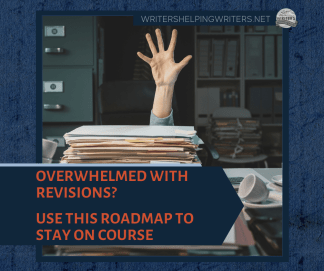
Is there a better feeling in the world than finishing a manuscript? Typing The End, gazing lovingly at the overall word count, and recognizing you���ve accomplished something that not many people can do���you���re floating on cloud nine, and all is right with the world.
And then come the revisions.
Hear that sound? That���s you, crashing to the ground.
Revision isn���t typically super fun because it requires you to look at your story���your perfect, incredible, one-of-a-kind story���realistically. You���re going to find problems���BIG problems���that need fixing. You���ll have to take a scalpel, machete, or jackhammer to your baby and carve out some of those words you were so proud of coming up with. It���s hard. Writers aren���t typically excited about this part of the journey.
But I would encourage you to look at it differently. Revision is how your story goes from good (or garbage) to great. Characters become more authentic and well-rounded, plotlines are streamlined, settings become multi-dimensional, pace-killing fluff and filler are eradicated, and your voice begins to shine.��
When you���re able to look at the revision process through this lens, it becomes a positive experience that results in something amazing, something that couldn���t have come about without it. So changing your mindset about revisions is a huge part of getting the most out of them.
But it���s not just our attitude about revision that limits us. Sometimes, it���s the process itself. There are so many story elements to examine and fix; it���s daunting to do all of this, especially for a full-length novel. This is why Angela and I created the Revision Roadmap at One Stop for Writers. It takes authors through the revision stage for their story one step at a time, breaking the process into manageable rounds. There are a million ways to revise, but here���s how we suggest chunking the process to make it doable.
Run a First Draft Health Assessment
After you���ve let your manuscript sit for a while to give you some much-needed objectivity, it���s time to read it again���but don���t make any changes. Not yet. At this point, just make notes of all the things you notice that need work. It can also help to use a checklist to make overall impressions about the major elements of the story, such as characters, plot, pacing, etc. Create your own resource or use our list of Final Draft Challenge Questions, which can be downloaded via the Revision Roadmap.
Revision Round 1: Rough in the Big Changes
Using the notes from your read-through, go back to your story and start working on the big-picture fixes: primary characters, character arc, plot, setting, theme, and pacing. Don���t try and make everything perfect; just get the changes framed in to shore up the weak spots.
Go back through your manuscript and tighten all the places you touched in the first round. Expand on them, tweak the wording, choose the right details, etc. As you go, start working on the next level of story elements: point-of-view, conflict, stakes, voice, etc. These don���t always take as much time as the big-picture items, so you can address them as you���re moving through this round.
Round 3: Incorporate Feedback FromCritique Partners
Getting feedback from other authors is pivotal for improving your story. This can happen at any point in the process, but we like it after the second round. This ensures that you���ve already fixed the problems you���ve been able to identify and will be giving readers a pretty solid version of your story. While you���re making changes based on their feedback, keep an eye out for other issues, like places where you���ve told instead of shown, spots where the pace is flagging, and descriptions that can be updated to do double-duty.
Polishing RoundNow you���re ready to get granular. Look for sentence structures that are repeated or read awkwardly, seek and destroy your favorite crutch words, rewrite passages where the flow doesn���t quite work, strengthen the dialogue, and correct typos.
And that���s it. By this time, you���ll have addressed your story���s major and minor issues. This is just one way of breaking up the work. Some writers like to split it up even more, which creates more rounds with fewer elements to work on in each. Others choose to take a scene-by-scene approach���essentially, dealing with everything at once but in smaller sections at a time.
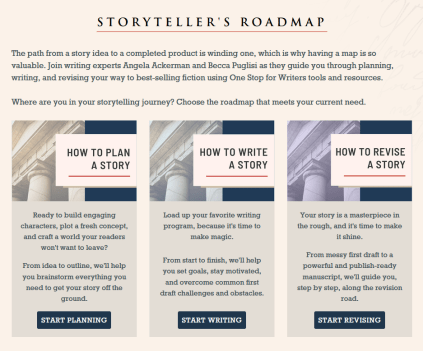
As with every part of writing a story, there���s no right or wrong way to revise. If you���ve already got a process that works for you, that���s awesome. Stick with it.
If revision tends to freak you out, our method can make this stage of the journey a little less scary. If you���d like more information on this process and its individual rounds, the One Stop for Writers Revision Roadmap has a ton of information and resources to keep things simple.
The post Overwhelmed with Revisions? Use This Roadmap to Stay On Course. appeared first on WRITERS HELPING WRITERS��.
July 1, 2023
Character Type and Trope Thesaurus: The Chosen One
In 1959, Carl Jung first popularized the idea of archetypes���”universal images that have existed since the remotest times.” He posited that every person is a blend of these 12 basic personalities. Ever since then, authors have been applying this idea to fictional characters, combining the different archetypes to come up with interesting new versions. The result is a sizable pool of character tropes that we see from one story to another.
Archetypes and tropes are popular storytelling elements because of their familiarity. Upon seeing them, readers know immediately who they’re dealing with and what role the nerd, dark lord, femme fatale, or monster hunter will play. As authors, we need to recognize the commonalities for each trope so we can write them in a recognizable way and create a rudimentary sketch for any character we want to create.
But when it comes to characters, no one wants just a sketch; we want a vibrant and striking cast full of color, depth, and contrast. Diving deeper into character creation is especially important when starting with tropes because the blessing of their familiarity is also a curse; without differentiation, the characters begin to look the same from story to story.
But no more. The Character Type and Trope Thesaurus allows you to outline the foundational elements of each trope while also exploring how to individualize them. In this way, you’ll be able to use historically tried-and-true character types to create a cast for your story that is anything but traditional.
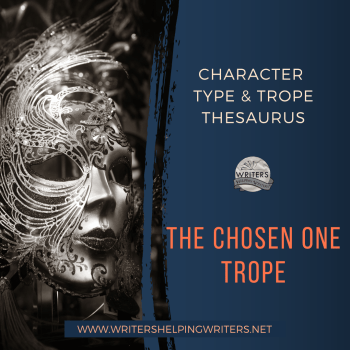 The Chosen One
The Chosen OneDESCRIPTION: This character is predetermined by fate, prophecy, or a higher power to save the world or do something equally heroic that no one else can do. They frequently possess special abilities���magical, supernatural, or symbolic���that set them apart from others.
FICTIONAL EXAMPLES: Harry Potter (the Harry Potter series), Frodo Baggins (The Lord of the Rings trilogy), Rand al’Thor (the Wheel of Time series), Paul Atreides (Dune), Buffy Summers (Buffy the Vampire Slayer)
COMMON STRENGTHS: Adventurous, Ambitious, Bold, Courageous, Enthusiastic, Focused, Honorable, Hospitable, Independent, Industrious, Observant, Persistent, Private, Resourceful, Responsible, Talented
COMMON WEAKNESSES: Apathetic, Cocky, Cowardly, Indecisive, Inhibited, Insecure, Uncooperative
ASSOCIATED ACTIONS, BEHAVIORS, AND TENDENCIES
Having special birth circumstances or lineage
Being driven by purpose
Being highly responsible
Eagerly accepting new challenges
Being respected or well-liked by supporters and allies
Feeling like they were made for more
Having a powerful sense of duty
Being generally optimistic
Being especially gifted in some way
Working hard to achieve their goals
Having a strong moral code
Having a strong sense of justice
Self-sacrificing
Becoming a good leader over the course of the story
Taking on more personal responsibility than is reasonable
Developing their talents so they can complete their task
Having deep resources of strength (or developing them) to draw from
Willingly putting themselves in harm’s way
Accepting guidance and mentorship
Not caring if they garner recognition for their actions
Wanting to give up at times
Being too trusting of the prophecy that set them apart
Declining help when it’s offered
Struggling with personal flaws or demons
Resenting the burden they’ve been given
Showing an initial reluctance to take on the task
SITUATIONS THAT WILL CHALLENGE THEM
The death of a mentor
Encountering an obstacle outside the scope of the prophecy they’ve relied on
Doubting the loyalty of an ally (because of miscommunication, uncertain motivations, etc.)
Finding out the prophecy was meant for someone else
Discovering the prophecy didn’t mean what they thought it did
INNER STRUGGLES TO GIVE THEM DEPTH
Struggling with impostor syndrome
Doubting their abilities
Having a deep sense of responsibility but feeling unprepared or unworthy to face their task
Feeling as if they must do everything on their own despite needing wise guidance and help
Having to choose between the welfare of a loved one and the good of the many
Having to sacrifice a dream to save the world
Realizing that having personal relationships will always put those people in danger from the evil the character is fighting
TWIST THIS TROPE WITH A CHARACTER WHO���
Thinks he was chosen to be a villain but ends up acting heroically instead
Initially fails to overcome evil and must develop as a person before succeeding
Is part of a team of uniquely gifted chosen ones who must work together to achieve victory
Learns new information that causes them to challenge the prophecy and attempt to redirect the outcome
Acts as a catalyst for mass change rather than being the sole hero of the story
Knows they aren’t the chosen one but takes on the role anyway
Has an atypical trait: Timid, flamboyant, weak-willed, foolish, scatterbrained, etc.
CLICH��S TO BE AWARE OF
An obscure farm boy who finds out he possesses magical powers and masters his abilities very quickly
An unskilled technician who receives overwhelming support as the chosen one with little resistance from others
A chosen one who wants to save the world by themselves but must accept the help of others to succeed
A too-specific prophecy that makes the plot predictable
A too-vague prophecy that generates no tension in the plot
Other Type and Trope Thesaurus entries can be found here.
 Need More Descriptive Help?
Need More Descriptive Help?While this thesaurus is still being developed, the rest of our descriptive collection (16 unique thesauri and growing) is accessible through the One Stop for Writers THESAURUS database.
If you like, swing by and check out the video walkthrough for this site, and then give our Free Trial a spin.
The post Character Type and Trope Thesaurus: The Chosen One appeared first on WRITERS HELPING WRITERS��.
June 29, 2023
Five Reasons to Identify Your Character���s Wounding Event
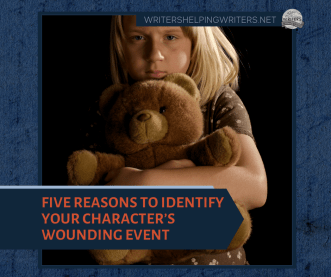
As human beings, we���re all products of our past; good and bad, our experiences have formed us into who we are. The same should be true of our characters. One way to make them really believable and memorable is to dig into their backgrounds and unearth those defining moments so we���ll better understand how they became the people they will be in our stories. Positive experiences have impact, but today I want to talk about the importance of identifying your character���s primary negative experience���also known as the emotional wound.
A wounding experience is an event or series of events from the past that was so negative it caused the character deep psychological pain. Being neglected as a child, living with chronic pain, being falsely accused of a crime, experiencing the death of a son or daughter���these can be deeply hurtful and formative events that will have lasting impact on a character. To this end, let���s explore why you need to know your character���s wound.
1) It Will Spawn Her Greatest FearWhen a wounding experience happens, the memories and negative emotions associated with it are long lasting. The event is so awful that the character becomes afraid that it or something like it will happen again. This fear can take many different forms associated with the wounding event. A girl (we���ll call her Natalie) whose brother committed suicide might become terrified that someone else in her close circle might do the same thing. If she blames herself for not noticing the warning signs, her biggest fear might be that she will miss important clues in other peoples��� lives that could lead to devastating consequences. Or the sense of abandonment could be the part that hurts most, making her fear being deserted by others in the future. Wounding events always give birth to debilitating fears that cripple our characters and keep them from thriving. To know the fear and its effects, we must first identify the wounding event that generated it.
2) It Will Alter Her Personality
Fear is a huge motivator; we���ll do just about anything to avoid the things that scare us. As such, your character���s greatest fear will cause the formation of new positive and negative traits that are meant to protect him or her from repeating that painful experience. Let���s say Natalie���s fear is being abandoned again. She may become needy, clinging to those she loves out of a fear of losing them. On the flip side, she might become abrasive so she can drive people away before they get too close. Of course, positive changes can come out of a fear too. Natalie might become a very observant person because she doesn���t want to miss those clues again. She could become empathetic, nurturing, passionate, or independent. Many of a character���s dominant traits will stem directly from that negative past experience, so it���s important to figure out what that is.
3) It Will Change Her BehaviorPersonality traits obviously determine the way we act. A grown-up, needy Natalie might develop new habits such as requiring constant reassurances of love from her spouse, prying into her friends��� private lives in order to stay connected, or using guilt to manipulate her children into spending time with her. Identifying the main wounding event from a character���s past will also show you her main personality traits, which will tell you how she���ll act and respond to various stimuli and circumstances, enabling you to write her consistently.
4) It Will Taint Her Beliefs About Herself and/or the WorldWhen something awful happens, it���s human nature to examine it to try and make sense of it, to figure out why it happened and who is to blame. This often results in a skewed view of the world or ourselves. If Natalie blames herself for missing her brother���s cries for help, she may come to believe that she is someone who can���t be counted on. On the other hand, if she blames someone or something external, she can easily become jaded toward that thing; for instance, if her brother was seeing a therapist about his depression, she may decide that therapy is a sham that doesn���t do anyone any good. None of these ideas are true, but once Natalie begins to believe them, her behavior, her choices, even her morals will align with those beliefs. They���re all connected, and they all result from that formative experience in the character���s past.
5) It Will Impact Her Life on Every LevelNeedy Natalie���s biggest fear is losing another loved one, but, ironically, she���s driving them away with her suffocating behavior. She often calls in sick at work so she can stay home in case her family needs her, and she���s close to losing her job. Her quality of life is stunted due to her constant anxiety and worrying. Every area of her life is being impacted by the aftershocks of the wounding experience.
This is how readers find Natalie at the beginning of the story. They know virtually none of the details that have brought her to this point; it���s too early for that yet. But as each page is turned, the details will become clear, and as they���re revealed, it all clicks into place. That���s why she���s so clingy! No wonder she���s such a worrywart! Everything will make sense for the reader because the foundation has been laid.
This is why it���s so important for every author to know their character���s wounding event. While it���s more work on the front end, it pays off in the form of higher reader satisfaction and a stronger empathy bond that can help build interest to carry them through to the very last page.
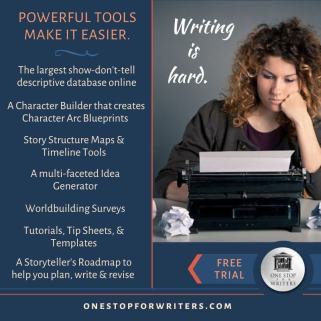 One Stop for Writers
One Stop for Writerscan help!
Dive deep into The Emotional Wound Thesaurus: A Writer���s Guide to Psychological Trauma, The Fear Thesaurus, and many other powerful resources to help you create authentic, dynamic characters.
The post Five Reasons to Identify Your Character���s Wounding Event appeared first on WRITERS HELPING WRITERS��.
June 27, 2023
Positive Traits Can Have Drawbacks, and Flaws Aren���t All Bad

I was watching Gone with the Wind the other night���because, you know, it was on TV and I had four hours to kill. As a teen, this was the first ���grown-up��� book I read, and ever since, I���ve had a serious girl-crush on Scarlett O���Hara. Which makes no sense, considering what a horrible person she is. I mean, she spends most of the story scheming to steal her only friend���s husband. When that doesn���t pan out, she marries her sister���s fianc�� to get his money.
She���s spoiled, materialistic, manipulative, and utterly self-involved. And yet, I love her as a character. If she wasn���t widely admired, I���d think there was something seriously wrong with me. But even after all these years, she continues to connect with people. Why is this?
For me, part of the reason lies in the duality of her flaws. As a spoiled brat, she embraces boldness to get what she wants. To pursue materialism, she needs to be resourceful. Cleverness goes hand-in-hand with her manipulative nature, and to obtain her selfish goals, she must be persistent.
Scarlett���s flaws aren���t one-dimensional. They have many facets���both positive and negative. This is how real people are. Our flaws, while limiting us and hurting our relationships, have beneficial features, too. Likewise, our positive attributes have associated negative elements.
I���ve come to understand that while most traits fit neatly into either the flaw or positive attribute category, many of them contain both good and bad sides. I recognize this in the traits that define me and the qualities I see in others.
The same should be true of our characters.
Utilizing both sides of a given trait will add realism to a character���s personality and increase your chances of him connecting with readers. Here are a few tips on how to tap into both sides of your character���s traits in the writing process:
Identify Your Character���s DEFINING TraitsThis should go without saying, but it���s vital to understand your character���s biggest flaws and attributes. Make a list of which traits they embody. Then, narrow it down to one primary flaw and one primary attribute. This will keep things clear for you, which will then ensure clarity for the reader.
For help figuring out which traits make sense for your character based on their history, you might find this Reverse Backstory Tool useful.
Explore Defining Traits from EVERY Angle
Once you���ve identified a primary flaw and attribute, brainstorm the behaviors and attitudes���positive and negative���that might manifest in a person who exhibits those traits. For example, if your character is controlling, his list might look something like this:
��� micromanages others
��� exhibits a lack of trust
��� pulls people away from loved ones to increase his control
��� manipulates others
��� is good at reading people
��� is passionate
��� shows incredible persistence
Your list should contain some positive and negative elements for each trait. Utilize the good and the bad to give your character depth. Perhaps his knack for reading people can benefit him in other ways, such as making him a successful cop or judge.
Maybe his passionate nature drives him to give of his time or money to a neighborhood charity. Show both sides of your character���s nature, and you���ll create a hero or villain that smacks of authenticity.
Building realistic characters is a crucial part of writing a successful story. Know your character���s defining traits and tap into the good and the bad that comes with them, and you���ll be on your way to creating multi-dimensional characters that will resonate with readers.
For more resources on this topic, please see our Character Resource Page.The post Positive Traits Can Have Drawbacks, and Flaws Aren���t All Bad appeared first on WRITERS HELPING WRITERS��.
June 23, 2023
Character Type & Trope Thesaurus: Lover
In 1959, Carl Jung first popularized the idea of archetypes���”universal images that have existed since the remotest times.” He posited that every person is a blend of these 12 basic personalities. Ever since then, authors have been applying this idea to fictional characters, combining the different archetypes to come up with interesting new versions. The result is a sizable pool of character tropes that we see from one story to another.
Archetypes and tropes are popular storytelling elements because of their familiarity. Upon seeing them, readers know immediately who they’re dealing with and what role the nerd, dark lord, femme fatale, or monster hunter will play. As authors, we need to recognize the commonalities for each trope so we can write them in a recognizable way and create a rudimentary sketch for any character we want to create.
But when it comes to characters, no one wants just a sketch; we want a vibrant and striking cast full of color, depth, and contrast. Diving deeper into character creation is especially important when starting with tropes because the blessing of their familiarity is also a curse; without differentiation, the characters begin to look the same from story to story.
But no more. The Character Type and Trope Thesaurus allows you to outline the foundational elements of each trope while also exploring how to individualize them. In this way, you’ll be able to use historically tried-and-true character types to create a cast for your story that is anything but traditional.
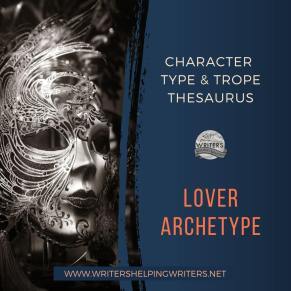 Lover Archetype
Lover ArchetypeDESCRIPTION: Lovers are passionate, sensual, and devoted, seeking the bliss of togetherness and love. They live life in full, show their heart in relationships, and focus on building closeness and intimacy with those they care about. Often this involves a romantic partner, but it can also manifest as strengthening core bonds with friends or family, making them feel loved and valued. Gone too far, emotions can become volatile, leading to obsession.
FICTIONAL EXAMPLES: Romeo and Juliet (Shakespeare���s Romeo and Juliet); Lady and the Tramp (Lady and the Tramp); Ross Geller (Friends); Alex Forrest (Fatal Attraction)
COMMON STRENGTHS
Affectionate, Charming, Empathetic, Flirtatious, Focused, Friendly, Generous, Gentle, Kind, Loyal, Nurturing, Passionate, Patient, Persistent, Persuasive, Playful, Protective, Sensual, Uninhibited
COMMON WEAKNESSES
Addictive, Controlling, Extravagant, Foolish, Frivolous, Gullible, Impulsive, Irrational, Jealous, Melodramatic, Needy, Obsessive, Oversensitive, Perfectionist, Possessive, Subservient, Worrywart
ASSOCIATED ACTIONS, BEHAVIORS, AND TENDENCIES
Being tuned into the emotions of others
Showing attentiveness and thoughtfulness
Accommodating loved ones and their needs
Seeing the best in someone
Seeking closeness and intimacy
Showing closeness through honesty and trust
Showing love through gifts, words of affection, acts of service, touching, and quality time
Encouraging others to open up and share their feelings
Displaying jealousy of rivals
Being envious of another���s close bonds or loving relationships
Yearning for (and seeking out) the perfect loving relationship
Close contact with others, frequent touching
Being sexually adventurous
Striving to make a good impression with others
Thinking carefully to say the right thing
Daydreaming and fantasizing about someone they are involved with
Paying compliments
Being an admirer of beauty
Caring about what others think about them
Being a people pleaser
Becoming obsessed with fixing relationship issues and erasing distance
Working to lift the spirits of loved ones
Going out of their way to be kind and helpful with loved ones
Experiencing life to the fullest
A willingness to try new things
Protectiveness of loved ones
Putting others first (sometimes to a fault)
Being an optimist and being energized by others who are like-minded
Being hit hard by betrayals and broken trust
Love-bombing (being too affectionate or attentive)
Being comfortable with emotional sharing
Encouraging others to share their feelings
SITUATIONS THAT WILL CHALLENGE THEM
A loved one setting boundaries or asking for space
Discovering a loved one has lied or kept something from them
Knowing another has a closer relationship than they do with someone they care about
Being asked to keep a relationship secret and private
Trying to build closeness with someone who has a lot of barriers and emotional shielding
Relationship break-ups
In laws with biases or prejudices against the character that prevent closeness
Loving someone with differing preferences (level of affection, comfort zones, sexual needs, communication styles, etc.)
INNER STRUGGLES TO GIVE THEM DEPTH
Wanting to express feelings but knowing it���s too soon and doing so could ruin everything
Feeling inadequate when rejected, no matter how kindly it���s been done
Wanting to be the person someone else wants, but also needing to stay true to themselves
Struggling to move on after a relationship ends
Having feelings for more than one person and not knowing how to choose
Wanting a closer relationship with a parent but struggling to move past something they did
Loving someone who only wants to be friends
Carrying the burden of unrequited love, knowing a future with them is impossible
Caring about someone who can���t see they are in a toxic relationship
Knowing their own feelings are bordering on obsession but being unable to step back
TWIST THIS TROPE WITH A CHARACTER WHO���
Falls for someone but doesn���t lose their sense of self (and so doesn���t try to be someone else or change to win love in return)
Is loving and seeks love, but has boundaries and respects the boundaries of others
CLICH��S TO BE AWARE OF
Loving someone and it being forbidden (the family is against it, the character lives in a caste system, religious intolerance is at play, etc.)
The character falling for someone when there’s no common ground, yet it ���just works���
One character trying to change the other to make a compatible match
Other Type and Trope Thesaurus entries can be found here.
 Need More Descriptive Help?
Need More Descriptive Help?While this thesaurus is still being developed, the rest of our descriptive collection (16 unique thesauri and growing) is accessible through the One Stop for Writers THESAURUS database.
If you like, swing by and check out the video walkthrough for this site, and then give our Free Trial a spin.
The post Character Type & Trope Thesaurus: Lover appeared first on WRITERS HELPING WRITERS��.
June 21, 2023
Phenomenal First Pages Contest
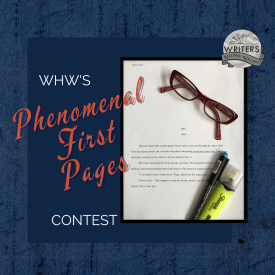 Hey, wonderful writerly people! It���s time for our monthly first-page critique contest
Hey, wonderful writerly people! It���s time for our monthly first-page critique contest  How to enter:
How to enter:Leave a comment if you���re working on a first page (in any genre except erotica) and would like some objective feedback. As long as the email address associated with your WordPress account/comment profile is up-to-date, I���ll be able to contact you if your first page is chosen. Just please know that if I���m unable to get in touch with you through that address, you���ll have to forfeit your win.
Two caveats:
 Please be sure your first page (double-spaced in 12-point font) is ready to go so I can critique it before next month���s contest rolls around. If it needs some work and you won���t be able to get it to me right away, let me ask that you plan on entering the next contest, once any necessary tweaking has been taken care of.
Please be sure your first page (double-spaced in 12-point font) is ready to go so I can critique it before next month���s contest rolls around. If it needs some work and you won���t be able to get it to me right away, let me ask that you plan on entering the next contest, once any necessary tweaking has been taken care of.
 This contest only runs for 24 hours, start to finish, so get your comment in there!
This contest only runs for 24 hours, start to finish, so get your comment in there!
Three commenters��� names will be randomly drawn and posted tomorrow morning. If you win, you can email me your first page and I���ll offer my feedback.
We run this contest on a monthly basis, so if you���d like to be notified when the next opportunity comes around, consider subscribing to our blog (see the right-hand sidebar).
Best of luck!
PS: If you want to amp up your first page, grab our helpful First Pages checklist from One Stop for Writers. And for more instruction on these important opening elements, see this Mother Lode of First Page Resources.
The post Phenomenal First Pages Contest appeared first on WRITERS HELPING WRITERS��.
Writers Helping Writers
- Angela Ackerman's profile
- 1022 followers



